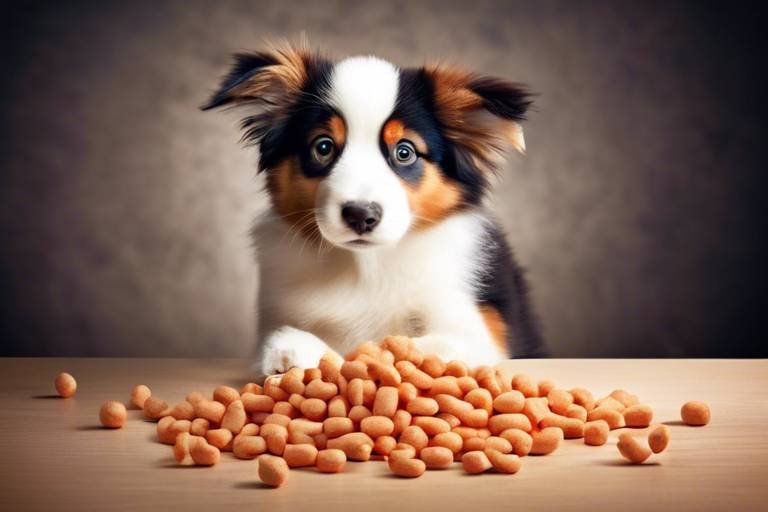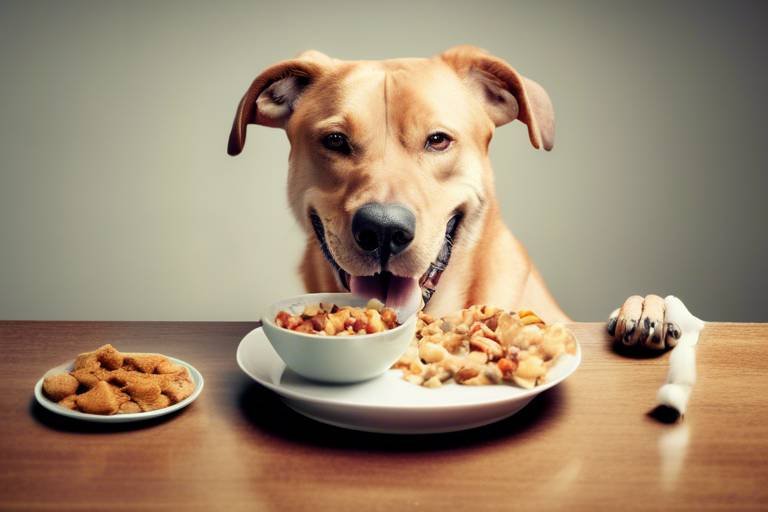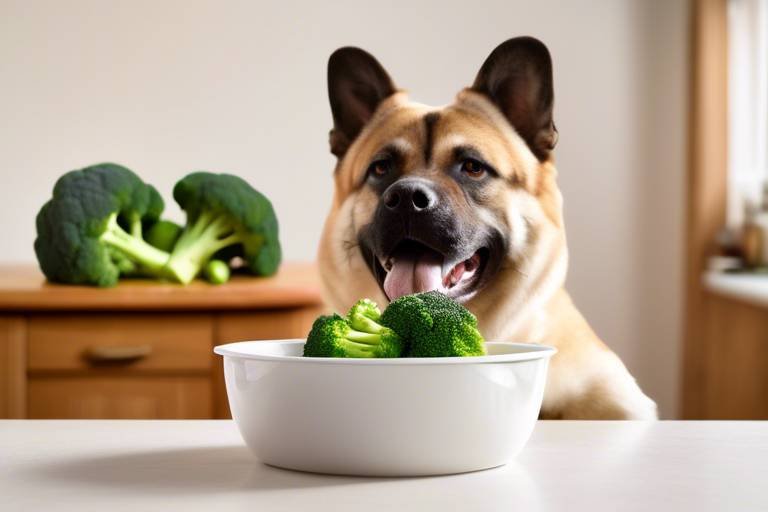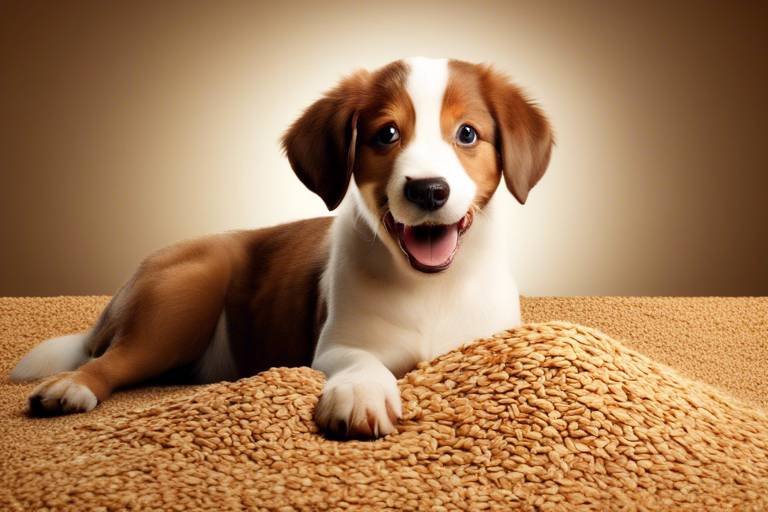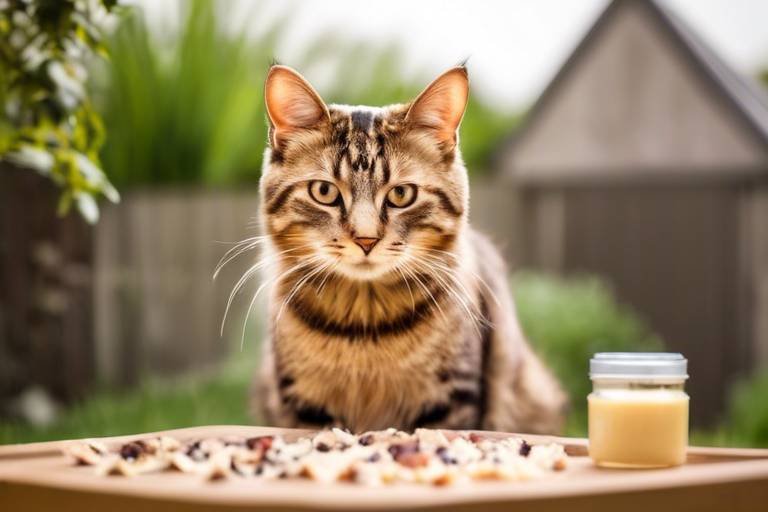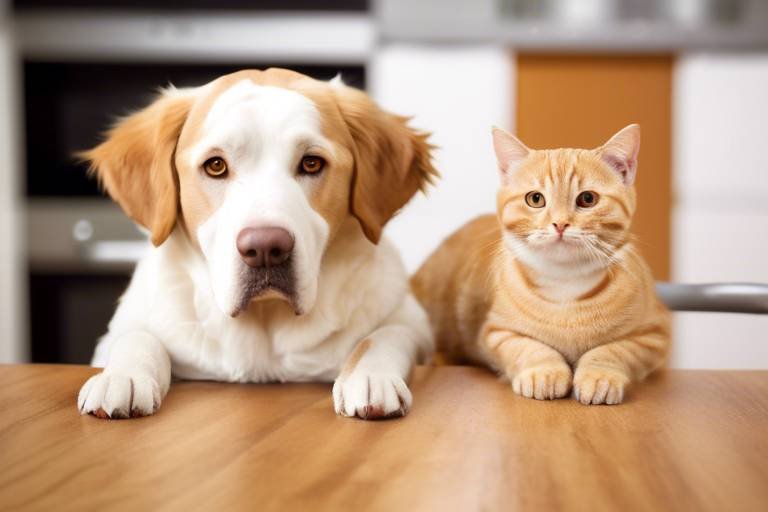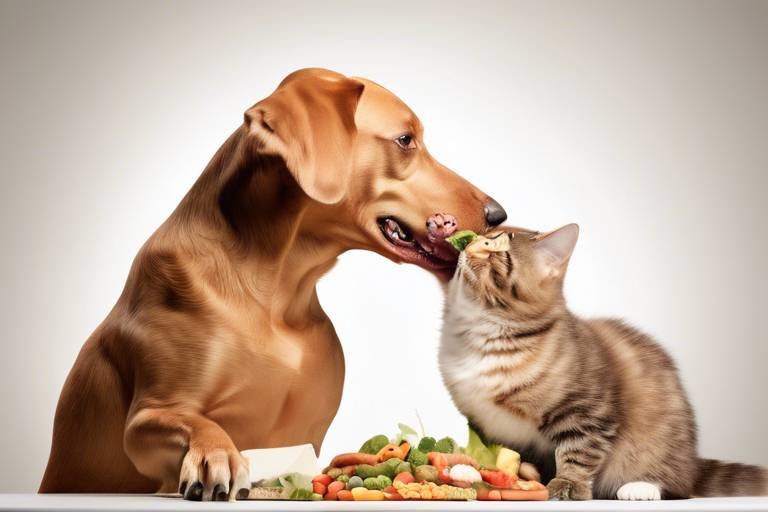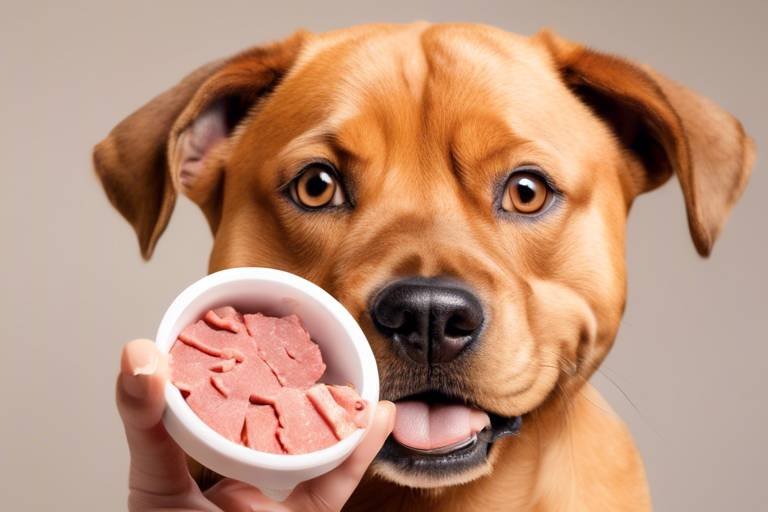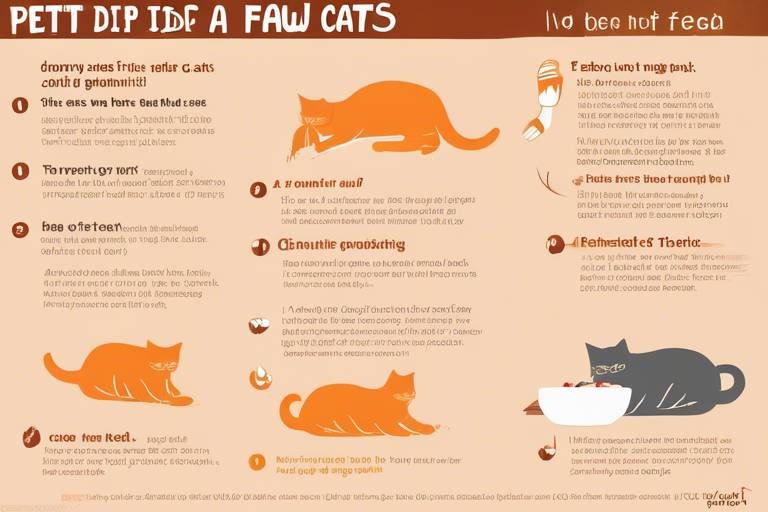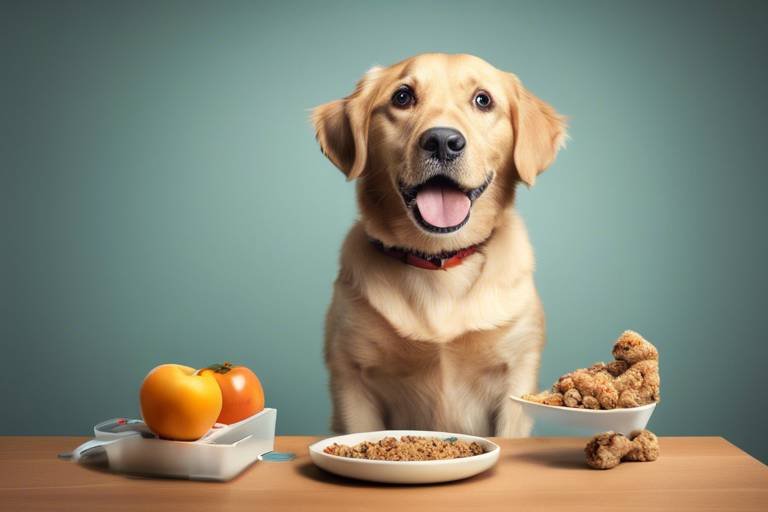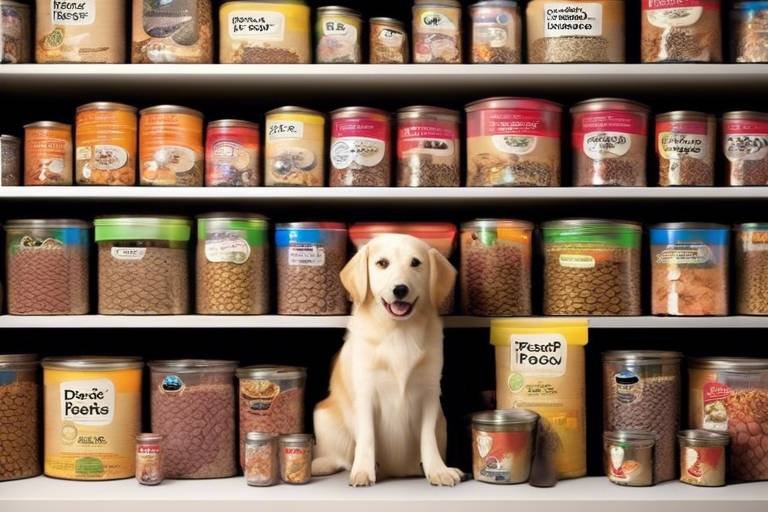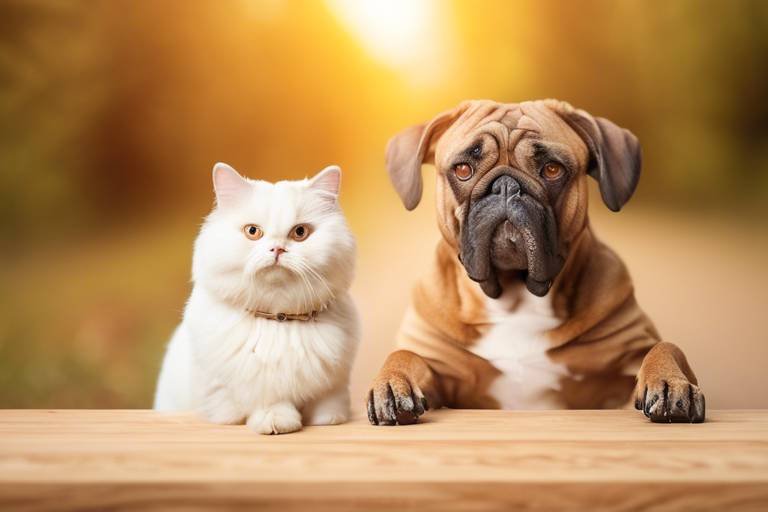The Role of Choline in Pet Nutrition
Choline is often regarded as a hidden gem in the world of pet nutrition, yet its role is absolutely vital for the health and well-being of our furry friends. Just like humans, pets require a range of nutrients to thrive, and choline is one of those essential building blocks. It plays a pivotal role in various bodily functions, including brain development, muscle movement, and liver function. Understanding the importance of choline can be a game-changer for pet owners who want to ensure their pets lead a healthy and active life.
So, why should we care about choline? Well, think of it as a key player in the intricate symphony of your pet's metabolism. Without it, the harmony of their bodily functions can be disrupted, leading to a range of health issues. Choline is involved in the production of acetylcholine, a neurotransmitter that is crucial for sending signals in the nervous system. This means that adequate choline levels are essential for your pet's cognitive function and overall behavior. Imagine your pet trying to fetch a ball but struggling to respond because their brain isn’t getting the signals it needs—this is the kind of scenario that can arise from choline deficiency.
Moreover, choline aids in the formation of cell membranes and is crucial for fat metabolism. It helps transport fats away from the liver, preventing conditions such as fatty liver disease. In essence, choline acts as a guardian of your pet's liver health. Without sufficient choline, pets can experience a buildup of fat in the liver, leading to serious health complications. Therefore, ensuring your pet's diet is rich in this nutrient is not just a recommendation; it’s a necessity.
In summary, choline is an essential nutrient that supports brain health, liver function, and muscle movement in pets. By incorporating choline-rich foods into their diets, pet owners can help their furry companions lead healthier, more fulfilling lives. As we delve deeper into the sources of choline and the consequences of deficiency, remember that a well-informed pet owner is the best advocate for their pet's health.
Choline is a vital nutrient that supports numerous bodily functions in pets. This section will cover its biochemical role and why it is crucial for both dogs and cats.
Choline can be found in various food sources. We will discuss the best dietary options for ensuring pets receive adequate amounts of this nutrient in their daily meals.
Animal products like eggs and liver are rich in choline. This subsection will highlight specific animal-based foods that can effectively boost choline levels in pet diets.
Eggs are one of the most concentrated sources of choline. We will explore how incorporating eggs into your pet's diet can enhance their nutritional intake.
Organ meats, such as liver, are also excellent sources of choline. This section discusses how to safely include these foods in your pet's diet.
While animal products are primary sources, some plants also contain choline. This subsection will identify plant-based options that pet owners can consider for their pets' diets.
A lack of choline can lead to serious health issues. This section will outline the symptoms and potential health consequences of choline deficiency in pets.
Recognizing the signs of choline deficiency is crucial for pet owners. We will discuss common symptoms to watch for and when to seek veterinary advice.
Choline deficiency can lead to liver damage and other health problems. This subsection will delve into the long-term effects of inadequate choline intake in pets.
- What is choline? Choline is an essential nutrient that supports various bodily functions, including brain health and liver function.
- How can I ensure my pet gets enough choline? Include choline-rich foods like eggs and organ meats in their diet.
- What are the symptoms of choline deficiency? Symptoms may include lethargy, poor growth, and liver issues.
- Is choline safe for all pets? Yes, choline is safe for dogs and cats when consumed in appropriate amounts.

Understanding Choline
This article explores the essential nutrient choline, its importance in pet diets, and how it influences overall health, growth, and development in various pets.
Choline is not just a fancy word that nutritionists throw around; it’s a vital nutrient that plays a crucial role in various bodily functions in our furry friends. Think of choline as a superhero in the nutrient world, helping to keep your pets healthy and vibrant. It’s involved in the synthesis of phospholipids, which are essential for building cell membranes. Without sufficient choline, your pet's cells might feel like they’re missing a crucial piece of their puzzle.
But why is choline so important for both dogs and cats? Well, it supports the production of neurotransmitters, which are the chemicals that allow nerve cells to communicate. This means that choline is critical for your pet’s brain health and cognitive function. Imagine your pet trying to solve a puzzle without all the pieces—frustrating, right? That’s what a lack of choline can do to their brain function! Moreover, choline is also involved in fat metabolism, which helps maintain a healthy weight and energy levels.
Interestingly, pets, much like humans, can’t produce enough choline on their own. This means that they rely heavily on their diet to meet their nutritional needs. In fact, choline is considered an essential nutrient, meaning it must be included in their daily intake. Just like you wouldn’t skip on your vitamins, your pets need their choline fix too! The recommended amounts vary based on factors like age, weight, and activity level, so it’s crucial to understand how to incorporate this nutrient into their meals effectively.
To give you a better idea of how choline fits into your pet’s diet, let’s look at some key functions it supports:
- Cell Structure: Choline is a building block for cell membranes.
- Brain Function: It aids in neurotransmitter production for better cognitive health.
- Fat Metabolism: Helps in the breakdown and transport of fats in the body.
In summary, understanding choline is key to ensuring your pet's overall health and well-being. It’s not just another nutrient; it’s a vital component that influences everything from brain health to cellular structure. So, as a responsible pet owner, it’s essential to ensure that your furry companions are getting enough of this superhero nutrient in their diets!

Sources of Choline
When it comes to ensuring that our furry friends receive all the essential nutrients they need, choline often flies under the radar. This crucial nutrient can be found in a variety of food sources, and understanding where to find it is key to maintaining your pet's health. Think of choline as the unsung hero in your pet's diet, quietly working behind the scenes to support their bodily functions. So, what are the best dietary options for ensuring your pets get enough choline? Let's dive into the rich world of choline sources!
Primarily, choline is abundant in animal-based foods, which serve as the most significant contributors to your pet's choline intake. Some of the top contenders include:
- Eggs - Often considered a superfood for pets, eggs are one of the most concentrated sources of choline.
- Organ Meats - Liver and other organ meats are not only delicious for pets but also packed with choline.
However, it's not just animal products that can help boost choline levels. Some plant-based sources also provide this essential nutrient, although they typically contain lower amounts. For pet owners who prefer a more plant-centric diet for their pets, consider options like:
- Cauliflower - A versatile vegetable that can be mixed into meals.
- Broccoli - Another great option that can be steamed and served as a side dish.
- Quinoa - A protein-packed grain that can be included in pet meals for an extra nutritional boost.
Incorporating these foods into your pet's diet can significantly enhance their overall nutritional intake. Just like humans, pets thrive on a balanced diet that includes a variety of nutrients, and choline is no exception. When planning your pet's meals, think of choline-rich foods as essential building blocks for their health. Not only does choline help with brain development and function, but it also plays a vital role in liver health and muscle movement.
As you explore different sources of choline for your pets, keep in mind that variety is key. Mixing animal-based and plant-based sources can create a well-rounded diet that meets all of your pet's nutritional needs. Remember, it's always a good idea to consult with a veterinarian or a pet nutritionist to tailor the best diet plan for your furry companion. After all, you want to ensure that they are not just surviving but thriving!
Animal-Based Sources
When it comes to ensuring that our furry friends get enough choline in their diets, animal-based sources stand out as the most effective options. Choline is crucial for various bodily functions, including liver health, brain development, and muscle movement. So, what are the best sources of this essential nutrient? Let's dive into the world of animal products that can help boost your pet's choline intake.
First on the list is eggs. These little powerhouses are not just a breakfast staple for humans; they are also one of the richest sources of choline available for pets. Just one large egg contains about 125 mg of choline, which is a significant contribution to your pet's daily needs. Incorporating eggs into your pet's diet can be as simple as scrambling them up or serving them boiled. But remember, moderation is key! Too many eggs can lead to an imbalance in their overall diet.
Next up, we have organ meats, particularly liver. This nutrient-dense food is often overlooked but packs a punch when it comes to choline content. For instance, beef liver contains about 420 mg of choline per 100 grams, making it an excellent option for pet owners looking to enhance their pet's nutritional profile. However, it’s essential to introduce organ meats gradually into your pet's diet to avoid digestive upset. A little goes a long way, and you can mix small amounts of liver into their regular food.
Other animal-based sources worth mentioning include fish and poultry. Fish, particularly salmon and sardines, are not only rich in omega-3 fatty acids but also provide a good amount of choline. Poultry, like chicken and turkey, can also contribute to your pet’s choline intake. These meats are versatile and can be cooked in various ways to keep your pet's meals exciting.
To summarize, here’s a quick table of some animal-based sources of choline and their approximate choline content:
| Food Source | Choline Content (mg per 100g) |
|---|---|
| Eggs | 125 |
| Beef Liver | 420 |
| Chicken Breast | 70 |
| Salmon | 56 |
| Sardines | 51 |
Incorporating these animal-based sources into your pet’s diet can significantly improve their choline intake, contributing to their overall health and well-being. Remember, it's always best to consult with your veterinarian before making any significant changes to your pet's diet, especially when introducing new foods. After all, we want to ensure that our beloved pets thrive and enjoy a long, healthy life!
Eggs as a Choline Source
When it comes to boosting your pet's nutritional intake, eggs are a true powerhouse. These little ovals are not just a breakfast staple for humans; they are also an excellent source of choline for our furry friends. Choline plays a critical role in various bodily functions, including brain development, liver health, and muscle function. So, why should you consider adding eggs to your pet's diet? Let's dive into the details!
First off, it's essential to understand just how much choline is packed into an egg. On average, a single large egg contains about 125 mg of choline. This is significant, especially when you consider that the daily recommended intake for dogs and cats varies based on their size and life stage. For instance, a growing puppy or kitten has higher choline needs compared to an adult pet. By incorporating eggs into their meals, you can help meet these nutritional demands effortlessly.
One of the best things about eggs is their versatility. You can serve them in various ways to keep mealtime exciting for your pet. Here are a few tasty ideas:
- Scrambled Eggs: Lightly scramble an egg in a pan with no oil or seasoning. Make sure it's fully cooked to avoid any risk of salmonella.
- Boiled Eggs: Hard-boiling eggs is simple and can be a great treat. Just chop them up and mix them into their regular food.
- Eggs in Treats: You can also find many pet treat recipes that incorporate eggs, making them a delicious and nutritious addition.
However, moderation is key! While eggs are nutritious, they should only be a part of a balanced diet. Too many eggs can lead to an imbalance in nutrients and might contribute to weight gain. As a general rule, one egg per week is a good starting point for most pets, but always consult your veterinarian for personalized advice based on your pet's specific needs.
In conclusion, eggs are a fantastic source of choline and can offer numerous health benefits for your pets. By incorporating them into their diet, you can help support their overall well-being, from brain health to muscle function. Just remember to serve them in moderation and always prioritize a balanced diet for your furry companions!
- Can I feed my pet raw eggs? It's generally not recommended to feed pets raw eggs due to the risk of salmonella. Always cook eggs thoroughly before serving.
- How often can I give my pet eggs? A good rule of thumb is one egg per week, but consult your vet for tailored advice based on your pet's individual needs.
- Are there any pets that should avoid eggs? Pets with specific dietary restrictions or allergies should avoid eggs. Always check with your vet if you're unsure.
Organ Meats and Choline
When it comes to ensuring our furry friends receive adequate nutrition, organ meats are often overlooked yet are incredibly beneficial. These nutrient-dense foods, particularly liver, are among the richest sources of choline available. Why is this important? Well, choline plays a pivotal role in brain function, liver health, and muscle movement. By incorporating organ meats into your pet's diet, you're not just feeding them; you're fueling their vitality and well-being.
Let's take a closer look at liver, one of the most potent sources of choline. Just a small serving can provide a significant boost to your pet's choline levels. For instance, a mere 100 grams of beef liver contains about 420 mg of choline, which is more than the daily requirement for most pets. This makes it a fantastic addition to their meals, especially for growing puppies and kittens that require more nutrients for their developing bodies.
However, with great power comes great responsibility. It's essential to introduce organ meats gradually into your pet's diet to avoid any digestive upset. Start with small portions and observe how your pet reacts. You might consider mixing a bit of cooked liver into their regular food to make the transition smoother. Remember, while organ meats are nutrient powerhouses, they should be fed in moderation. Too much can lead to an imbalance in their diet, particularly due to the high vitamin A content found in liver.
Here’s a quick overview of the benefits of including organ meats in your pet's diet:
| Benefit | Description |
|---|---|
| High in Choline | Supports brain health and liver function. |
| Rich in Vitamins | Contains essential vitamins like A, B12, and iron. |
| Improves Energy Levels | Provides a concentrated source of energy for active pets. |
In conclusion, organ meats, particularly liver, are a fantastic way to boost your pet's choline intake. Just remember to keep it balanced and consult with your veterinarian if you're unsure about the right portions for your furry friend. After all, their health is your top priority!
- How often should I feed my pet organ meats? - Organ meats should be fed in moderation, about once or twice a week, depending on your pet's overall diet.
- Can all pets eat organ meats? - Most pets can enjoy organ meats, but it's always best to consult your veterinarian, especially if your pet has specific health issues.
- Are there any risks associated with feeding organ meats? - Yes, overfeeding organ meats can lead to vitamin A toxicity and other nutritional imbalances. Always introduce them gradually and in small amounts.
Plant-Based Sources
While animal products are often highlighted as the primary sources of choline, it's important to recognize that some plant-based foods also contribute to this essential nutrient. This is particularly valuable for pet owners who may prefer a more plant-centric approach to their pets' diets. Incorporating these foods can help ensure that pets receive adequate amounts of choline without relying solely on animal products.
One of the standout plant-based sources of choline is soybeans. These little legumes are not only rich in protein but also pack a significant choline punch. For pets that tolerate soy, adding cooked soybeans or tofu to their meals can be a great way to boost their choline intake. Another excellent option is quinoa, a pseudo-grain that is becoming increasingly popular in pet foods due to its impressive nutritional profile. Quinoa is not only a source of choline but also provides essential amino acids, making it a well-rounded addition to your pet's diet.
Other notable plant-based sources include:
- Brussels sprouts: These tiny cabbages are not just a human favorite. They contain a decent amount of choline and can be steamed and offered as a treat.
- Broccoli: Another cruciferous vegetable, broccoli is not only safe for pets in moderation but also contributes to their choline needs.
- Cauliflower: Similar to broccoli, cauliflower can be a nutritious addition to your pet's diet, providing both fiber and choline.
It’s essential to remember that while these plant-based sources can be beneficial, they should not completely replace animal-based sources in your pet's diet. A balanced approach, incorporating both animal and plant foods, can help ensure that your pet receives all the necessary nutrients, including choline. Additionally, always consult with your veterinarian before making significant changes to your pet's diet to ensure that their specific health needs are met.
In conclusion, while animal products are rich in choline, there are several plant-based options that can complement your pet's diet. By diversifying their food sources, you can enhance their nutritional intake and overall health. Just like humans, pets thrive on variety, so why not mix things up a bit?

Choline Deficiency in Pets
Choline is not just a fancy term tossed around in pet nutrition; it’s a fundamental nutrient that plays a crucial role in your furry friends' health. When pets don’t get enough choline, it can lead to a host of problems that can seriously affect their well-being. Imagine trying to run a car without oil – it might still move, but it’s not going to perform at its best. Similarly, pets lacking choline might seem fine at first, but over time, deficiencies can wreak havoc on their bodies.
So, what exactly happens when your pet is low on choline? The symptoms can be subtle at first, but they progressively become more alarming. Common signs of choline deficiency include lethargy, poor coat quality, and even behavioral changes. You might notice your pet becoming less playful or more irritable. In severe cases, the absence of this essential nutrient can lead to liver damage, which is a serious concern for any pet owner. Think of the liver as the body's filter; without proper care, it can become overwhelmed and start to fail.
To give you a clearer picture, let’s break down some of the key symptoms and health implications of choline deficiency:
| Symptoms | Health Implications |
|---|---|
| Lethargy | Liver damage |
| Poor coat condition | |
| Behavioral changes | Muscle damage |
| Growth retardation in young pets | Reproductive issues |
It's essential for pet owners to be vigilant about their pets’ diets. If you suspect that your pet may not be getting enough choline, consulting a veterinarian should be your next step. They can help assess your pet's diet and recommend appropriate changes or supplements. Remember, just like we need a balanced diet to thrive, our pets do too. A little attention to their nutritional needs can go a long way in ensuring they live long, healthy, and vibrant lives.
In conclusion, choline deficiency is not something to take lightly. By understanding its importance and recognizing the symptoms, you can help safeguard your pet's health. After all, a well-nourished pet is a happy pet!
- What is choline? Choline is a nutrient that supports various bodily functions, including liver health, brain development, and muscle movement.
- How do I know if my pet is getting enough choline? Monitoring your pet's diet and consulting with a veterinarian can help ensure they receive adequate choline.
- Can I give my pet choline supplements? Yes, but it’s best to consult your veterinarian before adding any supplements to your pet's diet.
- What are the best food sources of choline for pets? Eggs, liver, and certain plant-based foods are excellent sources of choline.
Symptoms of Deficiency
Recognizing the signs of choline deficiency in pets is crucial for their well-being. Just like humans, pets can suffer from a lack of essential nutrients, and choline is no exception. When your furry friend doesn't get enough choline, it can lead to a series of alarming symptoms that may go unnoticed if you're not paying close attention.
One of the first signs you might notice is a change in your pet's energy levels. They may become lethargic or less active than usual. This can be particularly concerning if your pet is typically playful and energetic. Another common symptom is poor coat condition. If your pet's fur looks dull, dry, or is shedding excessively, it could be a sign of nutritional deficiencies, including choline.
In some cases, pets may also experience digestive issues. This could manifest as diarrhea or vomiting, which can lead to further complications if not addressed promptly. Additionally, neurological symptoms may arise due to the impact of choline deficiency on brain function. You might observe signs of confusion, disorientation, or even seizures in severe cases.
It's essential to be vigilant and watch for these symptoms. To help you better understand the potential signs of choline deficiency, here's a quick overview:
- Lethargy and decreased activity
- Poor coat condition
- Digestive issues (diarrhea or vomiting)
- Neurological symptoms (confusion, disorientation, seizures)
If you notice any of these symptoms in your pet, it's vital to consult with a veterinarian as soon as possible. Early detection and intervention can make a significant difference in your pet's health and recovery. Remember, just like how we need a balanced diet to thrive, our pets require the same attention to their nutritional needs. Don't hesitate to reach out to a professional if you're concerned about your pet's well-being.
1. What is choline and why is it important for pets?
Choline is a vital nutrient that supports various bodily functions in pets, including liver function, brain development, and muscle movement. It's essential for maintaining overall health.
2. How can I ensure my pet gets enough choline?
Incorporate choline-rich foods into your pet's diet, such as eggs, liver, and certain plant-based sources. Consult with your veterinarian for personalized dietary recommendations.
3. What should I do if I suspect my pet has a choline deficiency?
If you notice symptoms like lethargy, poor coat condition, or digestive issues, consult your veterinarian immediately for a proper diagnosis and treatment plan.
4. Are there any risks associated with too much choline?
While choline is essential, excessive amounts can lead to health issues. It's crucial to maintain a balanced diet and consult your veterinarian about your pet's specific needs.
Health Implications
When it comes to our furry friends, we often think of their diets in terms of protein, fats, and carbohydrates, but choline is a critical player that shouldn’t be overlooked. A deficiency in choline can lead to a range of serious health issues that can affect your pet's overall well-being. Imagine your pet’s body as a finely tuned machine; without the right fuel, it can start to sputter and fail. Choline plays a vital role in several bodily functions, including liver health, brain development, and cell membrane integrity.
One of the most alarming consequences of choline deficiency is liver damage. The liver is responsible for detoxifying the blood, producing essential proteins, and storing energy. If your pet doesn’t get enough choline, it can lead to the accumulation of fat in the liver, a condition known as hepatic lipidosis. This not only affects the liver's ability to function properly but can also lead to more severe conditions, including liver failure.
But that’s not all; choline is also crucial for brain health. Insufficient choline in a pet’s diet can impact cognitive function, leading to memory issues and behavioral changes. Just like how we need certain nutrients for optimal brain function, our pets do too! Poor cognitive health can manifest in various ways, such as increased anxiety, confusion, or even aggression.
Furthermore, choline is essential for the formation of neurotransmitters, which are chemical messengers that transmit signals in the brain. A lack of these neurotransmitters can affect your pet's mood and behavior, making them feel less like their usual selves. Imagine your pet as an artist; without the right colors (nutrients), they can’t create their masterpiece (a healthy life).
Here’s a quick rundown of some potential health implications of choline deficiency:
- Liver Damage: Accumulation of fat in the liver can lead to serious health issues.
- Cognitive Decline: Insufficient choline can impair memory and learning abilities.
- Behavioral Changes: Lack of choline may result in increased anxiety and mood swings.
- Reproductive Issues: Choline is important for reproductive health, and deficiency can affect pregnancy outcomes.
In conclusion, ensuring that your pet receives adequate choline is crucial for their health and happiness. Regularly consulting with your veterinarian about your pet's diet can help prevent these serious health issues. Remember, just like we need a balanced diet, our pets do too, and choline is a key ingredient in that mix!
Q: How can I tell if my pet is getting enough choline?
A: Regular check-ups with your veterinarian can help monitor your pet's nutritional intake. Look for signs of health issues, such as lethargy or changes in behavior, which could indicate a deficiency.
Q: Can I supplement my pet's diet with choline?
A: Yes, but it’s essential to consult your veterinarian before adding any supplements to your pet's diet. They can recommend appropriate dosages based on your pet's specific needs.
Q: Are there any specific breeds that need more choline?
A: While all pets need choline, certain breeds may have higher nutritional requirements. Always check with your vet for breed-specific advice.
Frequently Asked Questions
- What is choline and why is it important for pets?
Choline is a vital nutrient that plays a crucial role in various bodily functions in pets. It supports liver function, brain development, and muscle movement. Just like humans need certain vitamins, pets rely on choline for their overall health and well-being.
- What are the best sources of choline for my pet?
Animal-based sources are the richest in choline. Foods like eggs and organ meats, particularly liver, are excellent choices. If you're looking for plant-based options, some vegetables and legumes also contain choline, but they are not as concentrated as animal products.
- Can I give my pet eggs as a source of choline?
Absolutely! Eggs are one of the most concentrated sources of choline available. Incorporating cooked eggs into your pet's diet can significantly enhance their nutritional intake, making it a tasty and healthy treat.
- What are the symptoms of choline deficiency in pets?
Common symptoms of choline deficiency include lethargy, poor growth, and liver issues. If you notice any unusual behavior or symptoms in your pet, it's essential to consult your veterinarian for advice.
- How can I prevent choline deficiency in my pet?
To prevent choline deficiency, ensure your pet's diet includes adequate amounts of choline-rich foods. Regularly incorporating eggs and organ meats, along with a balanced diet, will help maintain their choline levels and overall health.
- Is choline supplementation necessary for my pet?
In most cases, if your pet is on a well-balanced diet that includes choline-rich foods, supplementation may not be necessary. However, if you have concerns about your pet's nutrition, it's best to consult with your veterinarian.
- Can choline deficiency lead to serious health problems?
Yes, a lack of choline can lead to significant health issues, including liver damage and neurological problems. Ensuring your pet receives enough choline is crucial to avoid these serious implications.

